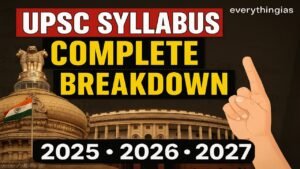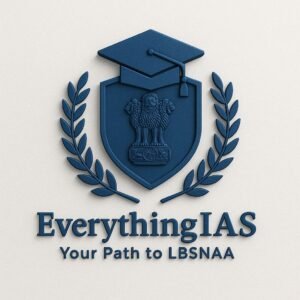Stay ahead in your UPSC preparation with the most relevant and high-yield topics from 4th July 2025. This edition covers India’s first indigenous gene therapy trial, the ISRO POEM-3 space mission, the controversial Digital Competition Bill, and PM Modi’s speech on the Global South’s role in world affairs. Also included are deep dives into judicial accountability, delimitation issues in Bihar, and debates over constitutional values like secularism and socialism. Each topic is simplified and analyzed with a UPSC lens — perfect for Prelims, Mains, and Essay writing.
Watch Video – Click

1. India’s First Indigenous Gene Therapy Trial for Cancer
✅ Key Points for UPSC (Mains & Prelims)
-
India initiated its first indigenous human trial for CAR-T cell therapy to treat head and neck cancer.
-
The trial is being conducted by Christian Medical College (CMC), Vellore, using a technology co-developed with IIT Bombay.
-
This innovation is supported by the National Biopharma Mission under the Department of Biotechnology (DBT).
-
CAR-T therapy modifies the patient’s own immune cells to fight cancer; until now, it was available only via expensive imports (~₹4 crore).
-
Indigenous version reduces the cost to about ₹40 lakh per patient.
🌐 Recent Developments & Global Context
-
CAR-T therapy is already in use in countries like the USA, China, and UK.
-
India joins a select group with self-developed immunotherapy technology.
-
The COVID-19 pandemic accelerated gene-based research and infrastructure development worldwide, which India is now leveraging for cancer treatment.
📜 Relevant Conventions and Treaties
-
No specific international treaty governs CAR-T, but it aligns with:
-
WHO’s Innovation and Access Framework.
-
TRIPS Flexibilities for life-saving innovations in developing countries.
-
India’s obligations under Universal Health Coverage (UHC) goals under SDG 3.
-
🌍 Implications for India and the World
-
Enhances India’s biotech self-reliance and healthcare accessibility.
-
Reduces healthcare costs for complex cancers.
-
Projects India as a leader in frugal innovation in the Global South.
-
Potential for global export of affordable biotech solutions in future.
2. ISRO’s POEM-3 Mission with International Payloads
✅ Key Points for UPSC (Mains & Prelims)
-
ISRO to launch POEM-3 (PSLV Orbital Experimental Module) under PSLV-C58.
-
Reuses PSLV’s fourth stage to host 7 international payloads, including from the USA and Germany.
-
Payloads include microgravity experiments, radiation sensors, and communication tech.
🌐 Recent Developments & Global Context
-
The POEM concept debuted in 2022 (PSLV-C53) and is part of India’s space innovation drive.
-
Global trust in ISRO’s low-cost, high-precision missions is increasing.
-
India’s space cooperation expands under IN-SPACe and Bilateral MOUs with France, Australia, and USA.
📜 Relevant Conventions and Treaties
-
Outer Space Treaty, 1967 – India is a signatory; governs peaceful use of space.
-
Moon Agreement (1979) – Not signed by India but relevant for long-term space law.
-
Bilateral MOUs with NASA, CNES, JAXA, and Roscosmos.
🌍 Implications for India and the World
-
Makes India a global hub for orbital research and experimental payloads.
-
Strengthens India’s commercial space sector and supports startups.
-
Enhances diplomatic partnerships through space science collaboration.
-
Contributes to India’s soft power in space diplomacy.
3. New Rules for CEC and EC Appointments
✅ Key Points for UPSC (Mains & Prelims)
-
The government notified new rules for CEC and Election Commissioners’ appointment under the Election Commission Act, 2023.
-
A three-member selection panel now includes:
-
Prime Minister (Chair)
-
Leader of Opposition (Lok Sabha)
-
Union Cabinet Minister (nominated by PM)
-
-
The Chief Justice of India has been excluded, raising concerns about neutrality.
🌐 Recent Developments & Global Context
-
Follows SC’s March 2023 judgment which advocated for a transparent and participatory appointment process.
-
In many countries like UK, Canada, and South Africa, election bodies are appointed by bipartisan committees or independent commissions.
-
Globally, there’s rising concern over executive interference in electoral institutions.
📜 Relevant Conventions and Treaties
-
Article 324 of the Indian Constitution – EC independence.
-
Universal Declaration of Human Rights (UDHR) – Article 21 guarantees fair democratic participation.
-
International IDEA guidelines for electoral integrity.
🌍 Implications for India and the World
-
May reduce public confidence in the autonomy of Election Commission.
-
Could impact India’s Electoral Democracy Index and Freedom House rankings.
-
Raises the need for a stronger bipartisan consensus in appointing constitutional authorities.
-
The world watches India’s model for democratic processes in Global South.
4. Delimitation and Electoral Roll Debate in Bihar
✅ Key Points for UPSC (Mains & Prelims)
-
Ahead of the 2025 Bihar Assembly elections, concerns over voter exclusion, especially migrants and marginalized groups, have emerged.
-
Critics allege political manipulation during delimitation-linked voter roll revisions.
🌐 Recent Developments & Global Context
-
India’s delimitation has been frozen until post-2026 Census, but special cases (like J&K 2022) were exceptions.
-
UK and Canada use independent boundary commissions to ensure transparency.
-
India’s electoral tech reforms (EPIC-Aadhaar linkage) face privacy and exclusion criticism.
📜 Relevant Conventions and Treaties
-
Representation of the People Act, 1950
-
Delimitation Commission Act, 2002
-
Articles 82 and 170 – Readjustment of seats post-Census.
🌍 Implications for India and the World
-
Perceived manipulation of rolls can damage India’s electoral credibility.
-
May increase voter apathy and legal challenges.
-
Global democracies assess fairness in India’s election infrastructure.
5. Custodial Death in UP Sparks Human Rights Concern
✅ Key Points for UPSC (Mains & Prelims)
-
A custodial death in Sultanpur, Uttar Pradesh has triggered national outrage.
-
Highlights poor enforcement of safeguards under Article 21 and DK Basu guidelines.
🌐 Recent Developments & Global Context
-
NHRC reported 2,400+ custodial deaths in 2022–23.
-
India has not ratified the UN Convention Against Torture (UNCAT).
-
Law Commission’s 273rd Report recommended a separate anti-torture law.
📜 Relevant Conventions and Treaties
-
UN Convention Against Torture (1984) – Signed, not ratified.
-
International Covenant on Civil and Political Rights (ICCPR) – Article 7 prohibits torture.
-
Nelson Mandela Rules – Humane treatment of prisoners.
🌍 Implications for India and the World
-
Weakens India’s rule of law image in global human rights discourse.
-
Could affect India’s role in UN Human Rights Council and bilateral treaties.
-
Pushes for urgent police reforms, body cameras, independent ombudsman.
6. Socialism and Secularism in the Constitution’s Preamble
✅ Key Points for UPSC (Mains & Prelims)
-
A public and political debate has reignited over removing “Socialist” and “Secular” from the Preamble.
-
These words were added via the 42nd Constitutional Amendment Act, 1976 during the Emergency.
-
However, the values are embedded throughout the Constitution even before the amendment.
🌐 Recent Developments & Global Context
-
Political leaders and a pending SC petition have called for the removal of these words.
-
The Supreme Court in Kesavananda Bharati (1973) established the Basic Structure Doctrine.
-
Other democracies like France, Canada, and Nordic countries enshrine secular and welfare-state values in law.
-
The Minerva Mills Case (1980) and S.R. Bommai (1994) reaffirmed secularism and socialism as part of the basic structure.
📜 Relevant Conventions and Treaties
-
UN Charter, Universal Declaration of Human Rights (UDHR) – Emphasize liberty, dignity, and social justice.
-
Articles 14–18: Right to Equality.
-
Articles 25–28: Religious Freedom.
-
Directive Principles (Articles 38, 39, 41, 42): Support socialism and welfare state.
🌍 Implications for India and the World
-
Removal could be seen as a move away from inclusive and pluralistic governance.
-
Risks internal social and communal unrest and weakens constitutional identity.
-
Internationally, may harm India’s image as a progressive, secular democracy.
-
Could influence India’s human rights scorecards and bilateral relations.
7. Parliamentary Library and Research Reforms
✅ Key Points for UPSC (Mains & Prelims)
-
There’s increasing demand to digitally upgrade the Parliament Library, one of the oldest legislative libraries (est. 1921).
-
The need is to improve MPs’ access to real-time research, AI tools, and legislative data.
🌐 Recent Developments & Global Context
-
Think tanks like PRS Legislative Research and Lokniti-CSDS have highlighted declining research quality.
-
UK Parliament and EU Parliament have in-house, AI-supported research services.
-
India’s Digital Sansad and NeVA (National eVidhan Application) are initial steps but underutilized.
📜 Relevant Conventions and Institutional Guidelines
-
Inter-Parliamentary Union (IPU): Emphasizes knowledge institutions under SDG 16.
-
OECD’s Parliamentary Principles: Stress access to independent, real-time policy analysis.
🌍 Implications for India and the World
-
Boosts legislative quality and evidence-based policymaking.
-
Ensures transparency, helps MPs with sectoral insights on laws, budgets, and bills.
-
Showcases India’s leadership in digital democratic institutions.
-
Can become a model for South-South knowledge collaboration.
8. Draft Digital Competition Bill
✅ Key Points for UPSC (Mains & Prelims)
-
India has released a Draft Digital Competition Bill targeting monopolistic behaviors by Big Tech.
-
Proposes classification of Systemically Significant Digital Enterprises (SSDEs) and pre-emptive regulation.
🌐 Recent Developments & Global Context
-
Mirrors the EU’s Digital Markets Act, Australia’s Competition and Consumer Amendment, and South Korea’s Platform Fairness Law.
-
Key issues addressed: Self-preferencing, bundling, unfair market access, cross-platform data misuse.
-
Comes amid global push for digital sovereignty and user protection.
📜 Relevant Conventions and Guidelines
-
OECD Digital Economy Reports – Best practices in fair digital markets.
-
UNCTAD Guidelines – On competition law enforcement in digital economies.
🌍 Implications for India and the World
-
Enhances India’s start-up ecosystem and promotes fair digital markets.
-
May face pushback from global tech giants, requiring diplomatic balancing.
-
Strengthens India’s case as a digital economy leader in the Global South.
9. PM Modi Advocates Voice of Global South at Ghana Parliament
✅ Key Points for UPSC (Mains & Prelims)
-
PM Modi addressed Ghana’s Parliament, calling for reforms in global governance institutions and stronger South-South cooperation.
-
Honored with “Order of the Star of Ghana”, the country’s highest civilian award.
🌐 Recent Developments & Global Context
-
India hosted the Voice of Global South Summit (2023) to amplify concerns of developing nations.
-
Under India’s G20 presidency, African Union was granted permanent membership.
-
PM Modi emphasized post-colonial solidarity and shared struggles with Africa.
📜 Relevant Treaties and Frameworks
-
United Nations Charter (1945): Sovereign equality.
-
Paris Agreement (2015): Different capabilities of developing nations.
-
South-South Cooperation Frameworks under UNOSSC.
🌍 Implications for India and the World
-
Positions India as a Global South leader and moral voice in international forums.
-
Enhances Africa-India strategic ties in trade, security, health, and education.
-
May help reshape global institutions like the IMF, WTO, UN for inclusive representation.
10. Centre Moves to Impeach Justice Yashwant Varma
✅ Key Points for UPSC (Mains & Prelims)
-
Burnt currency was found at the residence of Justice Yashwant Varma (Allahabad HC), triggering a move for impeachment.
-
Government initiating the removal process under Judges (Inquiry) Act, 1968.
🌐 Recent Developments & Global Context
-
Requires support from 100 Lok Sabha MPs or 50 Rajya Sabha MPs.
-
A three-member inquiry committee is formed after admission of the motion.
-
Only one impeachment attempt in India’s history – Justice V. Ramaswami (1993) – was withdrawn.
📜 Relevant Conventions and Treaties
-
Articles 124(4), 124(5), 217 of the Constitution – Impeachment of judges.
-
Bangalore Principles of Judicial Conduct (2002) – Global ethical framework for judges.
-
UN Basic Principles on the Independence of the Judiciary (1985).
🌍 Implications for India and the World
-
Upholding judicial accountability boosts public faith in judiciary.
-
Poor handling could dent India’s rule of law credentials in global democracy rankings.
-
Observed closely by UN agencies, foreign investors, and diplomatic partners.
